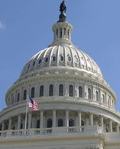 ASTMH continues to advocate before Congress and the Biden administration. Letters that ASTMH led or joined include:
ASTMH continues to advocate before Congress and the Biden administration. Letters that ASTMH led or joined include:
- A letter urging the Senate to promptly consider President Biden’s nomination for Director of the White House Office of Science and Technology Policy (OSTP).
- A letter of congratulations to Ambassador Nkengasong upon confirmation by the U.S. Senate as U.S. Global Aids Coordinator and Special Representative for Health Diplomacy.
- Written testimony to the Senate State and Foreign Operations Subcommittee in support of robust global health R&D funding for fiscal year 2023.
Read More:
House Appropriations Committee Passes Two Major Funding Bills, Includes Spending Increases for Global Health R&D
The House Appropriations Committee recently passed their versions of two annual funding bills, known as the State, Foreign Operations, and Related Programs (SFOPS) and Labor, Health and Human Services, Education, and Related Agencies (LHHS) spending bills. The bills included proposed funding increases for key federal global health R&D programs for fiscal year 2023 (FY23). Each bill includes a report with detailed instructions or, in some instances, directives to agencies and departments on how funding should be used.
Selected highlights from the FY23 House SFOPs and LHHS bills:
Proposed Funding for House FY23 SFOPs and LHHS Bills
+proposed funding increase in millions/percent increase compared to final FY22 House Budget (rounded)
- National Institute of Allergy and Infectious Diseases (NIAID): +319.9m/5%
Fogarty International Center: +12.7m/15%
- CDC:
- Center for Global Health: +111m/17%
- National Center for Emerging and Zoonotic Infectious Diseases (NCEZID): +106m/15%
- USAID:
- Malaria Program: +45m/6%
- Neglected Tropical Diseases Program: +5m/5%
These numbers are
not final and will likely change as the House and Senate and the two parties work out their differences for a final budget bill.
As for report highlights, the LHHS bill report included strong language in support of global R&D efforts at the Department of Health and Human Services (HHS), the Fogarty International Center, CDC and Biomedical Advanced Research and Development Authority (BARDA). The SFOPS report included strong language in support of USAID’s role in advancing global health R&D, as well as some additional funding increases that were not originally included in the bill text.
The LHHS and SFOPs spending bills will now move to the full House chamber for further consideration. The Senate Appropriations Committee is expected to begin drafting its SFOPS and LHHS spending bills following the July 4 recess.
House Passes Groundbreaking ARPA-H Legislation, A Critical Step Forward for Global Health R&D
The House of Representatives recently passed Rep. Anna Eshoo’s (D-CA) bipartisan
Advanced Research Projects Agency-Health (ARPA-H) Act —
H.R. 5585 — by a vote of 336-85. The legislation still needs Senate and White House approval before being finalized. The legislation will formally create a new independent agency within HHS, despite requests from the White House to situate ARPA-H within NIH. ARPA-H will be dedicated to accelerating biomedical innovation with a “mighty mission to cure and treat the world’s deadliest diseases,”
said Health Subcommittee Chairwoman Eshoo. The new agency will be modeled after the Defense Advanced Research Projects Agency (DARPA), which has helped develop transformative technologies including the Internet, GPS and mRNA vaccines. Eshoo’s legislation also prohibits ARPA-H from funding research projects in China, Iran, North Korea and Russia, or any other covered foreign entity under the National Security Act.
Dr. John Nkengasong Sworn in as PEPFAR Director
Dr. John Nkengasong, former head of the Africa Centers for Disease Control and Prevention, was recently sworn in as Ambassador-at-Large, U.S. Global AIDS Coordinator and Special Representative for Global Health Diplomacy at the U.S. Department of State. In this role, Ambassador Nkengasong will oversee the U.S. President’s Emergency Plan for AIDS Relief (PEPFAR). Nkengasong
praised PEPFAR as “one of the most successful global health initiatives,” noting that the program has saved more than 21 million lives and prevented millions of HIV infections.
Kigali Summit Concludes with Renewed Global Commitment to Fight Malaria and NTDs
Leaders in the global health community, including Past President Julie Jacobson, MD, DTM&H, FASTMH, recently convened in Rwanda for the Kigali Summit on Malaria and NTDs. On the final day of the week-long summit, world leaders
signed and adopted the Kigali Declaration on NTDs and reaffirmed their commitment to ending malaria by 2030. The
Kigali Declaration will play a crucial role in driving country ownership and stakeholder partnerships in the fight to eliminate NTDs across the globe.
President Biden Announces Nomination for White House Office of Science and Technology Policy Director (OSTP)
President Biden recently
announced that he intends to nominate Dr. Arati Prabhakar to serve as Director of the Office of Science and Technology Policy (OSTP). If confirmed, Dr. Prabhakar will also serve as Assistant to the President for Science and Technology. Prabhakar previously served as the head of DARPA from 2012-2017 and was unanimously confirmed by the U.S. Senate to direct the National Institutes of Standards and Technology (NIST), which she led from 1993-1997. "Dr. Prabhakar is a brilliant and highly-respected engineer and applied physicist and will lead the Office of Science and Technology Policy to leverage science, technology and innovation to expand our possibilities, solve our toughest challenges and make the impossible possible,"
said President Biden.